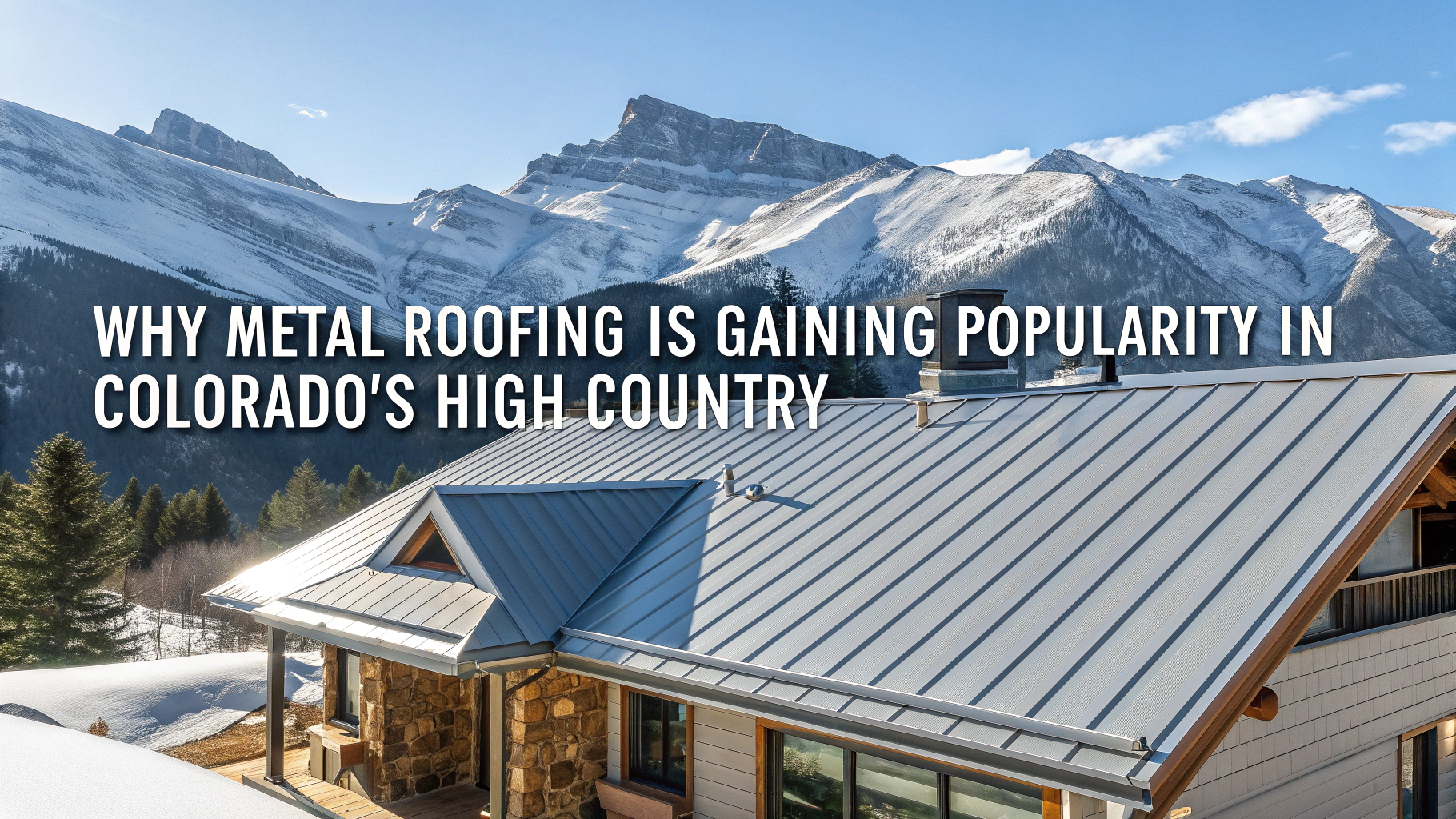Metal roofing has emerged as a preferred choice for homeowners and builders in Colorado’s mountainous regions, where extreme weather conditions demand exceptional durability and performance.
The high-altitude environment, with its heavy snowfall, intense UV exposure, and dramatic temperature swings, creates unique challenges that traditional roofing materials often struggle to handle effectively.
Understanding why metal roofs excel in these conditions can help property owners make informed decisions about their roofing investments.
Key Benefits of Metal Roofing in High Altitudes
- Superior snow shedding capabilities
- Exceptional wind resistance (up to 140 mph)
- 50+ year lifespan in proper conditions
- Fire resistance (Class A rating)
- Enhanced energy efficiency
Weather Resistance Features
Metal roofs naturally shed snow and ice, preventing dangerous accumulation that can stress structural components.
The interlocking panel design creates a watertight barrier against rain and melting snow.
UV-resistant coatings protect the metal surface from solar degradation at high altitudes.
Environmental Considerations
Metal roofing materials are typically made from 25-95% recycled content.
These roofs are 100% recyclable at the end of their service life.
The reflective surface helps reduce cooling costs during summer months.
Cost Analysis
| Roofing Type | Initial Cost | Lifespan |
|---|---|---|
| Metal Roofing | $10-14 per sq ft | 50+ years |
| Asphalt Shingles | $5-7 per sq ft | 15-20 years |
Installation Requirements
Professional installation by certified contractors is essential for optimal performance in high-altitude conditions.
Proper ventilation systems must be incorporated to prevent condensation issues.
Special snow guards may be necessary in areas with heavy snowfall.
Maintenance Tips
- Annual inspection of seams and fasteners
- Removal of debris from valleys and gutters
- Check for loose panels after severe storms
- Monitor snow guard systems during winter
Local Considerations
Check local building codes for specific metal roofing requirements in your Colorado municipality.
Verify that your chosen contractor has experience with high-altitude installations.
Consider local weather patterns when selecting specific metal roofing styles and materials.
Making the Right Choice for Your Home
Contact a local roofing professional for a detailed assessment of your specific needs and conditions.
Request multiple quotes and material samples before making a final decision.
For professional consultation, contact the Colorado Roofing Association at (303) 484-0549 or visit coloradoroofing.org.
Additional Design Options
Modern metal roofing comes in various styles and finishes that complement mountain architecture:
- Standing seam profiles
- Stone-coated metal tiles
- Wood-grain textured panels
- Custom color options
Insurance Benefits
Many insurance companies offer premium discounts for metal roof installations due to their superior protection against:
- Fire damage
- Hail impact
- Wind damage
- Snow load stress
Winter Performance Features
Snow Management
Strategic placement of snow retention systems helps control snow shed in high-traffic areas.
Heated snow melt systems can be easily integrated into metal roofing panels.
Ice Dam Prevention
Smooth metal surfaces and proper insulation minimize ice dam formation.
Continuous panel design reduces weak points where ice can penetrate.
Securing Your Mountain Home Investment
Metal roofing represents a long-term solution for Colorado’s challenging mountain environment, offering superior protection and value over traditional roofing materials.
The combination of durability, weather resistance, and environmental benefits makes metal roofing an intelligent choice for high-altitude properties.
When properly installed and maintained, a metal roof system provides decades of reliable service while enhancing your property’s value and appearance.
FAQs
- Why is metal roofing becoming increasingly popular in Colorado’s high-altitude areas?
Metal roofing is gaining popularity due to its superior snow shedding capabilities, resistance to extreme temperature fluctuations, and ability to withstand high winds common in Colorado’s mountains. - How long does a metal roof last in Colorado’s climate?
A properly installed metal roof can last 40-70 years in Colorado’s climate, significantly outlasting traditional asphalt shingles which typically need replacement every 15-20 years. - Does metal roofing help with energy efficiency in high altitudes?
Yes, metal roofs reflect solar radiation and provide excellent insulation, helping maintain consistent indoor temperatures and reducing heating costs during Colorado’s cold mountain winters. - How does metal roofing handle Colorado’s heavy snow loads?
Metal roofing’s smooth surface and specialized snow guards help manage snow loads effectively, preventing dangerous snow avalanches while allowing gradual snow shedding. - Is metal roofing more expensive than traditional roofing in Colorado?
While initial costs are 2-3 times higher than asphalt shingles, metal roofing’s longevity, durability, and reduced maintenance needs make it cost-effective over time in Colorado’s harsh climate. - Can metal roofs withstand Colorado’s hail storms?
Modern metal roofs are engineered to resist impact from hail, often carrying Class 4 impact resistance ratings, the highest available for roofing materials. - What types of metal roofing work best in Colorado’s high country?
Standing seam metal roofs and metal shingles made from steel or aluminum with proper coating systems are most suitable for Colorado’s alpine environment. - Do metal roofs require special maintenance in high-altitude conditions?
Metal roofs require minimal maintenance in high altitudes, typically needing only periodic inspections of fasteners, sealants, and snow guards to ensure optimal performance. - How do metal roofs perform during Colorado’s extreme temperature swings?
Metal roofing expands and contracts with temperature changes without cracking or deteriorating, making it ideal for Colorado’s dramatic temperature fluctuations. - Is metal roofing environmentally friendly for mountain communities?
Yes, metal roofing is environmentally sustainable, being 100% recyclable, energy-efficient, and often made from recycled materials.
